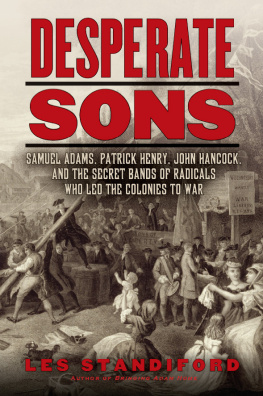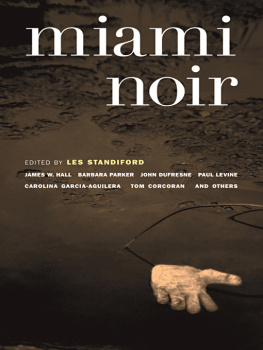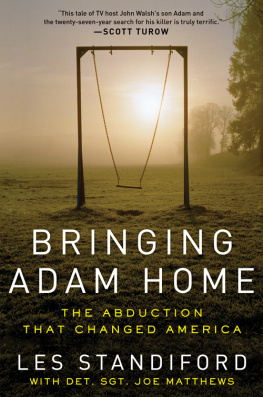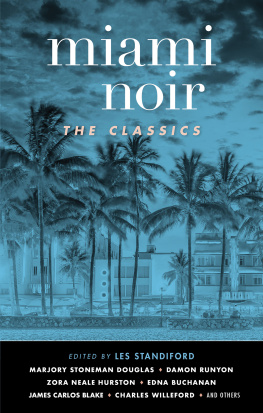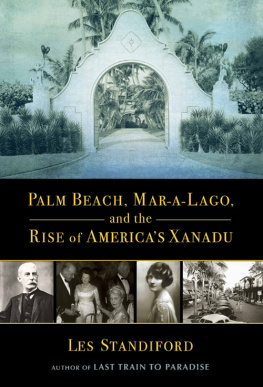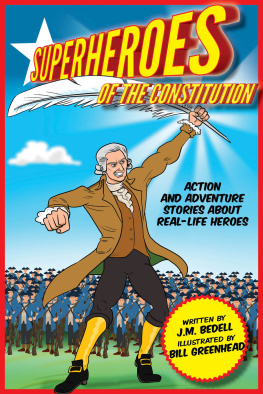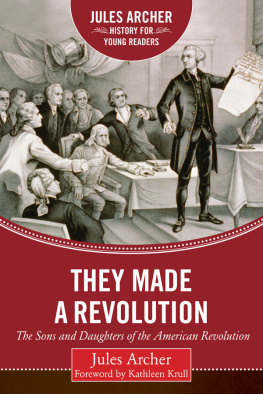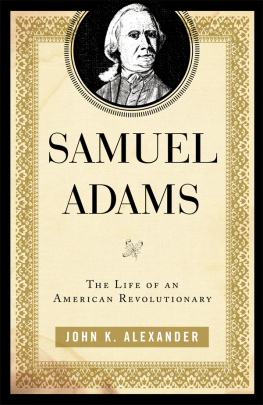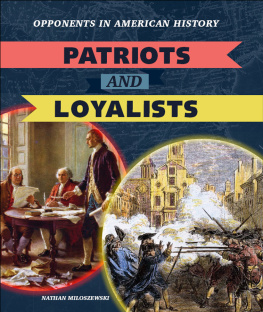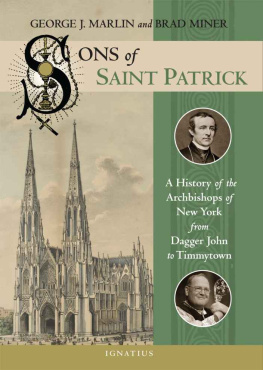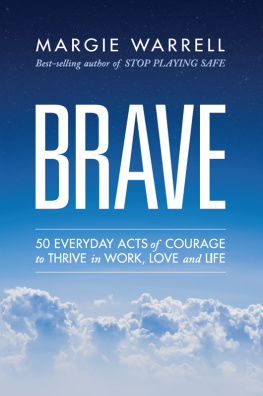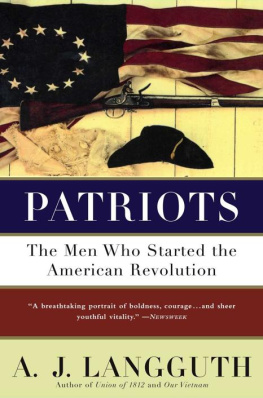
DESPERATE SONS
Samuel Adams, Patrick Henry, John Hancock, and the Secret Bands of Radicals Who Led the Colonies to War

LES STANDIFORD

This book is dedicated to don of dons Phil Sullivan,
who taught me to be suspicious of knowledge
and to treasure wisdom.
And to the memory of Zander,
who lived his brief life fully.
I write these things as they seem true to me,
for the stories told by the Greeks
are various and in my opinion absurd.
HECATAEUS THE MILESIAN,
father of history,
fifth century BC
You havent got a revolution
that doesnt involve bloodshed.
MALCOLM X
Contents
I am greatly indebted to many who helped me find my way through this undertaking, including my stalwart guide through the stacks both near and far, Adis Beesting, reference librarian at Florida International University. Special thanks are also due James R. Kelly, humanities bibliographer at the W. E. B. Du Bois Library at the University of Massachusetts, who was so helpful during the early floundering days.
Many thanks as well to my editor, Bill Strachan, who believed in this material from the beginning and whose patience and encouragement allowed me to persevere. I am also indebted to my agent, Kim Witherspoon, who unfailingly provided me with assurance that it was possible.
As usual, I could count on James W. Hall and Mitchell Kaplan for careful over-the-shoulder reading and invaluable conceptual advice, and I am equally fortunate to have the careful proofing eyes of Bill Beesting and Brian Sullivan. And as always, I am grateful for the support of so many friends and my family, who have reminded me so often and for so long that such work is worthwhile: Madeleine Blais; Mike and Liz Novak; Steve Leveen; my closest and most faithful reader and mother-in-law, Rhoda Kurzweil; my wife, Kimberly; my son, Jeremy; and my daughter, Hannah. I strive to do you all proud.
C an there truly be anything left to say about the set of events that compose the American Revolution? Possibly it is an odd question at the beginning of a book about that very subject, but it is also the sort that this writer has asked himself before.
Of course, it is the reader who is best positioned to give the final answer as to whether a book should have been created, but on the other hand, and since there is very little of the slightest historical import that has not been written about well and truly, one might argue that we could, except for the production of the most arcane treatises, leave off the writing of history altogether. I speak theoretically, of course.
If someone asks me just what sort of history it is I aspire to, I might cite E. H. Gombrich and his book A Little History of the World , in which he covers most everything of importance from the Stone Age through the atomic bomb in 277 lyrical pages. Ostensibly the book was written for children, though if most of my own graduate students came to class having mastered half of what Gombrich has to give, Id feel a minder of geniuses. History begins, Gombrich says, with a when and a where. It is 3100 BC, when, as we believe, a king named Menes was ruling over Egypt. If you want to know exactly where Egypt is, I suggest you ask a swallow. Every autumn, when it gets cold, swallows fly south. Over the mountains to Italy, and on across a little stretch of sea, and then theyre in Africa, in the part that lies nearest to Europe. Egypt is close by. My kind of history, if you want to know. Gombrichs purpose is not to remake history but to bring readers to a fresh appreciation of it.
In the present case, the story centers not so much on the individuals whose names have become synonymous with the American Revolution: the activists turned glorified statesmen such as John Hancock, George Washington, Thomas Jefferson, James Madison, and John Adams; and the familiar firebrand heroes such as Paul Revere, Patrick Henry, Nathan Hale, and others. Nor did I wish to tread the familiar ground of the revolutionary battlefieldonce I reached the moment where the shot heard round the world is fired, I reasoned, I would quit the field. This, in fact, is the story of the group of men who brought the colonies to that pass.
Academic historians have discussed the Sons of Liberty in discrete contexts in numerous books and articles. And certainly a number of the struggles and the exploits sometimes associated with the Sons of Liberty, including the Boston Massacre, the Midnight Ride, and the Boston Tea Party, are prominent in the popular consciousnessas are the names of Revere, John Adams, Hancock, Henry, and others. But despite the drama and the importance of their role, I am aware of no overarching work of narrative history focusing on the Sons of Liberty in readying the colonies for battle against Great Britain, a step of such magnitude that modern readers may find it difficult to truly appreciate: consider for a moment that the counterculture movement of the 1960s had actually been successful in toppling the U.S. government at gunpoint, and one might begin to comprehend the accomplishment of the Sons.
My intention here is to tell the story surrounding a group of men who propelled the country to the breaking point. Some of these men have been termed the Old Revolutionaries by one prominent historian who has studied a handful of them in depth, but the title is something of a misnomer. Certainly, it is an epithet none would have ever visited upon themselves while in the thick of it.
These were vigorous men, men of action and of conviction. Most of them were considered dangerous by the majority of the citizenry among whom they lived, and some of them actually were. More than one was willing to commit acts of violence in service of the causes that they espoused.
Yet, by the time a new nation was ready to be formed, few would find places of prominence in its governance. For one thing, it was understood that if these men were willing to destroy one system of government, what was to prevent them from becoming impatient with the new one? True revolutionariesmen willing to risk everything to topple a regimesimply cannot be trusted. Or to put it a different way, one mans patriot is another mans terrorist.
The descriptions of events at the heart of this book are drawn largely from letters, newspapers, historical accounts, broadsides, and other contemporary documents. These materials reflect a growing unrest in the American colonies of the 1760s and 1770s, and nearly simultaneous eruptions of acts of violence and civil disobedience in Boston, New York, Providence, Charleston, and elsewhere. There was a long history of friction between the colonies and the mother country prior to 1765, of course, and although much was made of philosophy and concepts such as liberty and the right to self-governance, a great deal of unrest in the decade prior to the outbreak of war also came down to money.
Lest that all sound too venal, it should be understood that the operative attitude of many colonists in late 1765 was that they were being bled dry by an utterly indifferent British Parliament looking to bail out of its own overspending by exploiting Britains colonies. The ability to run a successful businessor indeed to earn a livingbrave spokesmen such as Samuel Adams complained, was being compromised by the ever-more-onerous tax legislation imposed upon the colonies. Worse yet, the colonists had no say because such matters were being debated thousands of miles away. In fact, when stated in this fashion, the reasons for the discontent of the American colonists sound much like the complaints of the contemporary citizens of Main Street when the possibility of any new tax is mentioned in Congress or during presidential debates.
Next page
